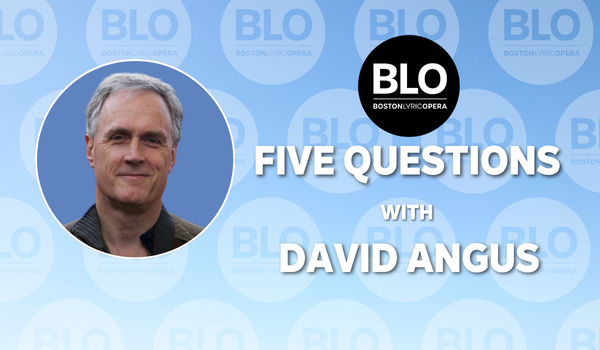
As opera continues to evolve in response to cultural, technological, and society shifts, BLO remains at the forefront, reimagining classic repertoires, integrating bold contemporary works, and making opera more accessible to everyone in our community. We love opera for where it’s been and where it’s going.
In our interview series, Opera’s Next Act, BLO’s artistic leadership shares in their own words what excites them about opera’s past, present and future. Recently, we sat down with BLO Music Director David Angus to hear his thoughts.
About David
Now in his fifteenth year as Boston Lyric Opera’s Music Director, David Angus has served as music director and conductor for many of BLO’s critically-acclaimed productions. This season, he has helmed Verdi’s Aida and Mozart’s Mitridate, re di Ponto, and will conduct Rodgers & Hammerstein’s Carousel and Benjamin Britten’s Noah’s Flood in the spring. In addition to his work with BLO, he recently conducted a new Sweeney Todd at the Royal Opera in Stockholm, Le nozze di Figaro in Prague, and several recordings of new American works with the London Philharmonic Orchestra.
Prior to his time at BLO, David was music director of The Glimmerglass Festival and Chief Conductor of the Symphony Orchestra of Flanders. He has led orchestras and choirs throughout Europe, particularly in Scandinavia, including the Lahti Symphony Orchestra and several Danish orchestras. Born in England, David has conducted most of the major orchestras in Great Britain, including the London Philharmonic, the Royal Philharmonic Orchestra, the Hallé Orchestra, most of the BBC orchestras, the London Mozart Players, and the Scottish Chamber Orchestra. His love of music started at an early age; David was a boy chorister at King’s College under Sir David Willcocks and read music at Surrey University. He was a conducting fellow at the Royal Northern College of Music in Manchester, where he won several prizes for opera conducting.
What made you want to take on a leadership role in opera?
It was never my aim to take a leadership role — it just happened to me! I was invited to be Music Director while working at Glimmerglass Opera, and then again at BLO. And in each case I was very pleased to say, “Yes, please!” Being Music Director gives me the chance to help build the company, through working for the highest possible musical values for everything — chorus, orchestra, soloists, repertoire, and more!
How have you seen opera change in the past 10 years?
Apart from the obvious health issues, Covid has hurt the arts financially. However, every problem can be a disaster or a challenge, and the opera companies that are surviving now are leaner and more inventive. New repertoire is being created all the time, and the overblown routine productions of a limited repertoire that were very common in the past are thankfully rare now. The Black Lives Matter and the #MeToo movements are helping to balance representation throughout the business in an extremely positive way, widening the range of performers and creators, right through to all the support teams. This is a very healthy development that will greatly widen opera’s connection with people of all backgrounds, and should ensure a greater future for the art form.
Why should modern audiences care about opera/classical music?
I deeply believe that opera is the most complex and rewarding of all art forms, and, when done well, it can have the biggest emotional impact and greatest meaning for its audiences. We have a wonderful treasure trove of repertoire that we can continue to perform and explore, but the fact that so many writers and composers are producing new works at such a high rate of speed proves that they realise the significance of opera and the potential it has to connect with all people, whether or not they know anything about it!
What is your vision for the future of opera?
I think that there is a place for opera of all scales, from tiny chamber operas to grand spectacles, and I hope that theatrical and musical standards continue to rise. The ever-growing repertoire, especially created by and written about people who were not represented in the past, will only increase opera’s relevance. During Covid, people couldn’t attend live opera, and having seen so many of our supporters (and even our own people) on the verge of tears when they first got back to hearing the live human singing voice, I realised just how powerful and important our work is. There can be a very exciting future for the art form if it is done well enough!
What is your favorite opera?
Tricky question! I usually say whichever opera I’m working on. I get totally immersed in whatever I’m conducting, and there is a reason why many of the major works survive — they are brilliant! Le nozze di Figaro is probably the most perfect opera, but I love the variety of my work and I would hate to lose any other Mozart, Britten, Janáček, Puccini, Verdi, Rossini, Tchaikovsky… the list never ends!
You can learn more about David and the rest of our incredible leadership team here!
Thank you for reading CODA! Coda comes from the Latin word for “tail,” and in music, it indicates an additional passage at the end of a piece, a final flourish that complements what’s come before. CODA goes beyond the curtain call to explore this unique and astonishing art form. Whether you’re a first-time opera-goer or a seasoned audience member, CODA is for you. Biweekly, we’ll enhance your experience of opera with behind-the-scenes highlights, educational articles, listening lists, and much, much more!
Tickets are on sale now for our star-studded 2024/25 season! Up next: Anthony Roth Costanzo in Vivaldi’s The Seasons; followed by Brandie Sutton and Jamie Barton in Rodgers & Hammerstein’s American classic, Carousel.Want to learn more? Sign up for our mailing list to stay up to date on all things BLO.
